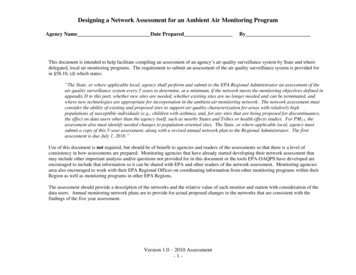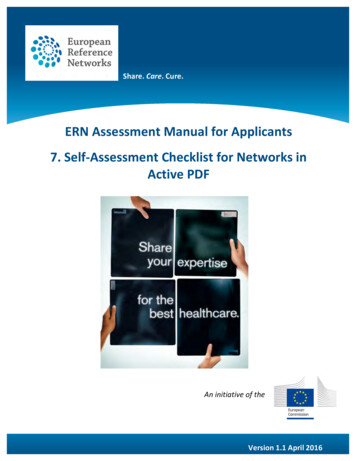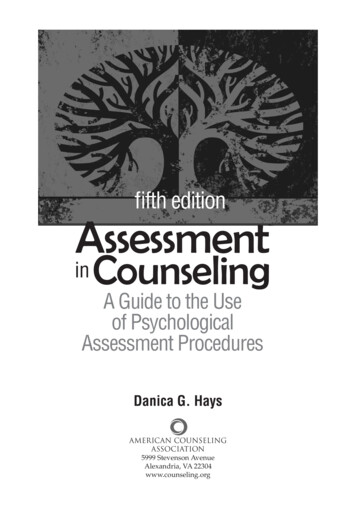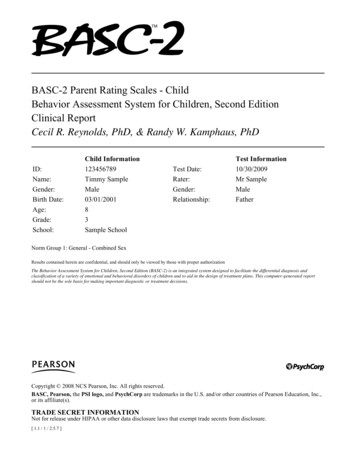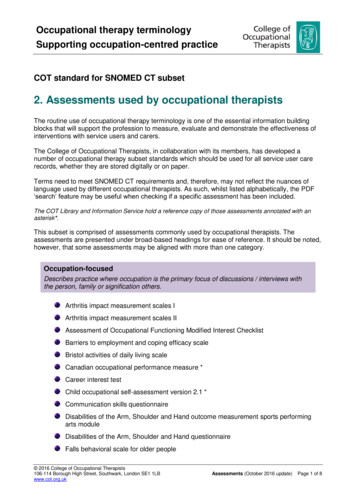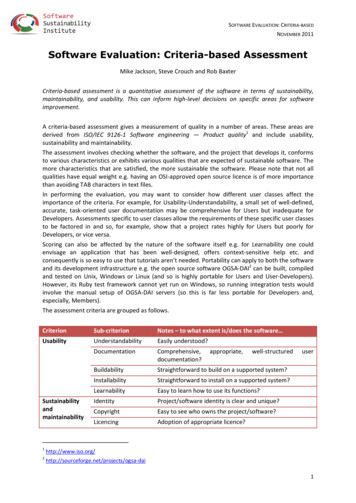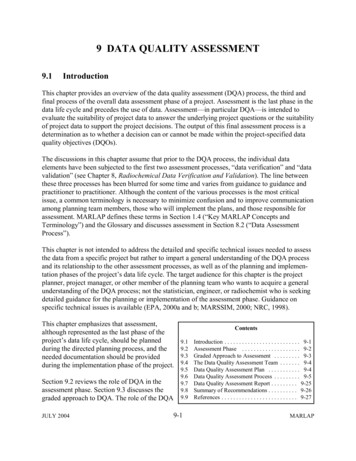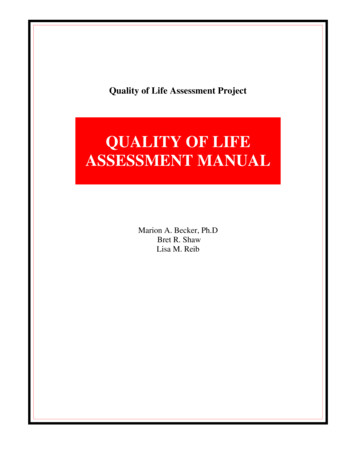
Transcription
THE EEB’SASSESSMENTOF THE ENVIRONMENTAL PERFORMANCE OFTHE SLOVENIAN PRESIDENCY OF THE EUJULY - DECEMBER 2021
We are Europe’s largest network ofenvironmental citizens’ organisations.We bring together over 170 civil societyorganisations from more than 35 Europeancountries. Together, we work for a better futurewhere people and nature thrive together.The EEB is an International non-profit association /Association internationale sans but lucratif (AISBL).EC register for interest representatives:Identification number 06798511314-27BCE identification number: 0415.814.848RPM Tribunal de l’entreprise francophone de BruxellesPublished January 2022Responsible editor: Jeremy WatesEuropean Environmental Bureau (EEB)With thanks to Umanotera for their supportand input and to Seas at Risk for marine input.Rue des Deux Eglises 14-161000 Brussels, Belgium 32 (0)2 289 1090eeb@eeb.orgeeb.orgmeta.eeb.orgWith the support of the LIFE Programme of the European Union, the German Federal Ministry of theEnvironment, Nature Conservation and Nuclear Safety and the German Environment AgencyThis communication reflects the authors’ views and does not commit the donors.
IntroductionThis is an assessment of the Slovenian Presidency of theCouncil of the European Union by the EuropeanEnvironmental Bureau (EEB), the largest network ofenvironmental citizens' organisations in Europe, withthanks for inputs from Umanotera and Seas at Risk,signed off by the EEB Board with members from acrossEurope. Our mandate encompasses all environmentrelated issues, a broad agenda comprising ‘traditional’environmental issues as well as sectoral and horizontalpolicies with a direct or potential environmental impact,sustainable development and participatory democracy.We view the six-month Council Presidencies asconvenient periods over which to measure progress onthe EU’s environment-related policies and legislation.We appreciate that a Presidency cannot make decisionson its own; it needs the cooperation of the EuropeanCommission, European Parliament and other MemberStates. Nonetheless, the Presidency can still haveconsiderable impact and influence, for examplethrough the priority and profile it gives to specific issuesand through the way in which it chairs discussions,prioritises practical work and engages with otherMember States to enable progress.Success depends on the willingness of Member Statesto commit as well as on political will, ideas, and the useof political capital to achieve results. In addition, policyagendas are often highly affected by external eventsand new Commission priorities, as has been and still isthe case with the Covid-19 crisis. Our assessmenttherefore addresses separately both effort and result.The assessment is not an overall political assessment ofthe Presidency’s performance, nor is it an assessmentof the Slovenian national political or environmentalsituation or its domestic policies, except to a limiteddegree linked to its role in leading or failing to lead byexample. We are not assessing its role on foreign affairsissues, internal security matters or migration policies,for example, except insofar as such issues have a directbearing on the environment. On the other hand, theassessment is not limited to the activities and outcomesof the Environment Council; it covers all Councilconfigurations to the extent that they deal with topicsthat affect the environment, as well as the EuropeanCouncil, which is formally not under the SlovenianPresidency responsibility, but where the Presidencyplays an important role. Our assessment is based onthe Ten Green Tests we presented to the SlovenianGovernment at the start of its Presidency on 1 July 2021.The Slovenian Presidency comes at the end of thesecond year of the European Green Deal and hadconsiderable responsibility for helping to make theEuropean Green Deal the transformative agenda it waspromised to be and needs to be. It has had to face anongoing challenge of dealing with the Covid-19 crisisand fuel price crisis whilst progressing theenvironmental agenda.At the outset, we would like to acknowledge andexpress our appreciation for the cooperative approachadopted by the Slovenian Presidency.Jeremy WatesSecretary General1
Ten Green Tests for the SlovenianPresidency: Assessment‘Missed opportunities for needed progress on climate, pollution andagriculture, mixed results on Aarhus and the Green Recovery.Politics is the art of the possible. However, if and wherethe possible does too little to avoid dramatic climatechange, halt catastrophic biodiversity loss, reducepollution exposure, or improve governance systems ina way that gives confidence in our governments,institutions and future, then we cannot assess theprogress to be good, despite efforts. In times of climate,biodiversity and pollution crises, Member States’governments under the leadership of the CouncilPresidency need to make considerable additionalefforts to change what is perceived as possible to alignwith what is needed. It is in this light of both effort andimpact in the context of needs, that we have assessedthe performance against the Ten Green Tests.On the Slovenian Presidency’s performance against theTen Green Tests, item-by-item, we reached thefollowing conclusions:Effort1Drive a just transition to a sustainable and resilientEurope with the European Green Deal at its core2Catalyse the green transition through tax reform and useof the MFF and Recovery Package3Address the climate emergency and promote sustainablemobility4Reverse the dramatic loss of biodiversity and invest inthe resilience of our ecosystems5Initiate a rapid transition towards sustainable food andagriculture6Promote a zero-pollution ambition - clean water andclean air for all7Drive a circular economy and prevent waste8Shift towards a zero-pollution industry9Support a toxic-free environment and the ambitiousimplementation of the Chemicals Strategy102Promote European solidarity, wellbeing, social andenvironmental justice, and accountabilityOutcome
1 Drive a just transition to a sustainable andresilient Europe with the European Green Dealat its coreThe verdictMixed on effortMixed on outcomeThe first Green Test asked the Slovenian Presidency to: embrace the European Green Deal as a core Presidency priority;promote a progressive 8th Environment Action Programme (8EAP); push forward the reform of the EU's internationaltrade policy and withdraw from the Energy Charter Treaty; ensure transparency and public participation in the roll outof the Green Agenda for the Western Balkans and the Economic Investment Plan; and ensure that the ‘BetterRegulation’ process contributes to the European Green Deal (EGD).Key developments The EGD continued to be rolled out during the sixmonths of the Slovenian presidency, with over adozen environmental and climate legislativeproposals launched, generally without significantdelays.endorsing political agreementParliament on 10 December. The 8th Environment Action Programme (8EAP)was agreed at the final trilogue in December,after intense negotiation, with Member StateswiththeThere have now been eight rounds ofnegotiations to ‘modernise’ the Energy CharterTreaty (ECT) and a growing number of MemberStates are demanding a legal analysis for a jointwithdrawal from the treaty. No such legalanalysis has been shared by the Commission,despite repeated calls for one.Good The final agreement on the 8EAP included severalimportant improvements to the Commission’sproposals. The Council helped push for the 2024mid-term assessment with potential for alegislativeresponse.Italsoembracedprogressive measures on soil (a law promised for2023), noise and light, and embraced thewellbeing economy and need for system change,supported environmentally harmful subsidyreform, a beyond GDP indicator dashboard, andgovernance improvements formalising therequirement for a discussion of progress with theCouncil and Parliament. The Green Agenda for the Western BalkansAction Plan was agreed.Less good No date was agreed for the actual removal ofenvironmental harmfully subsidies in the 8EAP. The Green Agenda for the Western BalkansAction Plan lacks clarity, contains only indicativetarget years, and only marginal civil societyengagement and funding opportunities. prospects of reform and an increase in thenumber of Member States that are consideringleaving the Treaty. Slovenia did not seem to have pushed for theintegration of the sustainability-first principle inFit for Future Platform.The Presidency did not show leadership towardsa joint withdrawal from the ECT, despite littleOverall, while there was good progress on the 8EAP and the EGD stayed at the core of European policy, there was amissed opportunity for Slovenian leadership and proactive engagement on the Energy Charter Treaty, from which theEU has not withdrawn. So overall the verdict is mixed on effort and mixed on impact.3
2 Catalyse the green transition through tax reformand use of the MFF and Recovery PackageThe verdictMixed on effortMixed on outcomeThis second Test called on the Presidency to lead the Council in negotiations on the fiscal reform initiatives - EmissionsTrading Scheme (ETS), Carbon Border Adjustment Mechanism (CBAM) and Energy Taxation Directive (ETD); to promotecompliance with the ‘do no significant harm’ principle in the use of EU Funds and ensure that it is fully embedded in allTaxonomy Delegated Acts; and to lead by example in implementing the EGD in the EU Budget (MFF) PartnershipAgreements (PAs) and in National Recovery and Resilience Plans (NRRPs) through targeted investments andtransformative policy reform.Key developments TheSlovenianPresidencyheldCouncildiscussions on the ETS at the October andDecember Environment Councils as well as onCBAM and ETD at the Economic and FinancialAffairs Council in November.A draft Commission proposal for a delegated actincluding gas and nuclear in the taxonomy wascirculated to Member States for comment on 31December 2021, with a view to adoption in early2022.On 6 July, the Commission proposed a Regulationon a voluntary European Green Bond Standard(EUGBS). On 1 July, the Commission gave the green light toSlovenia’s NRRP, submitted on 30 April. On 15 December, heads of state and therepresentatives of the EU signed the JointDeclaration of the Eastern Partnership Summit,committing, inter alia, to a green transition. Political provisional agreement was reached onthe revision of the trans-European energynetwork (TEN-E) Regulation on 15 December. Agreement was reached on the EU 2022 budgeton 16 November.Good The Slovenian Presidency engaged all relevantCouncil formations in the discussions of the ETS,CBAM and ETD and published a Fit-for-55progress report on 22 November.fossil fuel projects receive funding from theConnecting Europe Facility. In the provisional agreement on the TEN-Eregulation, there is a commitment that no newFormally, the Slovenian NRRP included 42% ofclimate finance, above the 37% threshold, andthe final NRRP was significantly better thanearlier versions, which had included roadinfrastructure and aviation investments.Less good While on paper the Slovenian NRRP is compliantwith the formal 37% climate spending target, theanalysis of the Green Recovery tracker only founda 21% green spending share of Slovenia’s NRRP.In addition, there was little on renewables,energy efficiency or sustainable transport. Therewas also little public participation and nocommitment to strengthen Slovenia’s carbon tax.Slovenia pushed for nuclear to be included in thetaxonomy, including through the Prime Ministerat COP26, and seem to be planning a new nuclearpower plant. The inclusion of nuclear and gas inthe Taxonomy, under the strong pressure of thelobby and some Member States, would riskundermining the whole instrument. Slovenia only made a superficial effort to arguethat key investments of its NRRP respect the ‘dono significant harm’ (DNSH) principle.Overall, the Slovenian Presidency provided Council time to discuss the EU-ETS, CBAM and ETD, but without muchprogress, although it succeeded in facilitating agreement on the TEN-E Regulation. The push for nuclear and the missedopportunities for innovative projects and policy reform under the NRRPs are unfortunate and are slowing necessaryprogress. Overall, the verdict is mixed for effort and mixed for impact.4
3 Address the climate emergency and promotesustainable mobilityThe verdictMixed on effortPoor on outcomeThe third Test called on the Presidency to: lead Council negotiations on the Fit for 55 package and hold constructive andfact-based discussions; demonstrate EU ambition and leadership at COP26; promote sustainable mobility; and lead byexample in the implementation of the Climate Adaptation Strategy and on carbon taxation.Key developments The Council discussed key Fit for 55’s files,including the emissions trading scheme (ETS),Carbon Border Adjustment Mechanism (CBAM),Effort Sharing Regulation (ESR), Renewable EnergyDirective II (RED II), Energy Efficiency Directive,Land Use, Land-Use Change and Forestry(LULUCF) Regulation, CO2 from cars and vans,Energy Tax Directive (ETD), and Social ClimateFund. TEN-E:CouncilandParliamentreachedprovisional political agreement in triloguenegotiations on new rules for cross-border energyprojects under the Trans-European Networks forEnergy (TEN-E) on 15 December 2021. The Council agreed climate finance for developingcountries on 29 October, with ECOFIN CouncilConclusions on 5 October, and UNFCCC COP26Council Conclusions on 6 October. The Eurovignette reform introduced varyinginfrastructure and user charges for heavy-dutyvehicles based on CO2 emissions. The UNFCCC COP26 Council Conclusions helpedthe Presidency and Commission to speak with onevoice and push for maintaining the 1.5oC targetthat was at risk.The Eurovignette road charging reform wasadopted by the Council on 7 November 2021.Good The Presidency allocated significant policy time tothe climate files at the informal Council meeting(12-13 July 2021) and across all relevant Councilformations, preparing progress reports on 22November and 6 December, helping to set thescene for progress under the French Presidency.Less Good The Slovenian Presidency did not take a stronglead in the negotiations around the different filesof the Fit for 55 package, notably on the CBAM,EED and the REDII, which have been characterisedby pressures from Member States to water downthe provisions.The discussions around the revision of the EEDhave been mostly focused on Member States’requests of increased flexibility and a leakedversion of the Presidency proposal suggests thateven the indicative national targets would bescrapped in favour of indicative nationalcontributions.The Slovenian Presidency did not seem to bepushing for an ambitious RED II and there areconcerns about the potential elimination ofnational targets for renewables in the buildingsector where the integration of decentralisedrenewable production is the easiest. At the UNFCCC climate COP26, Slovenia focusedon 2050 decarbonisation and nuclear energywithout proposing strong short- and long-termmeasures, thus failing to be a strong lead for theEU and globally. Instead of strengthening the domestic carbonprice incentive, e.g. by increasing its carbon tax forthe non-ETS sector, Slovenia prepared theintroduction of a cost compensation scheme forenergy intensive industry, financed from ETSrevenues, and hence showed a bad example toother Member States.Slovenia provided space for extensive discussions of Fit-for-55 files across Council formations. However, several files havebeen weakened in the process. This was disappointing, as was Slovenian leadership at COP26 and its support for nuclearin the Taxonomy that all undermine EGD progress. Overall, the verdict is therefore mixed on effort and poor on result.5
4 Reverse the dramatic loss of biodiversity andinvest in the resilience of our ecosystemsThe verdictGood on effortMixed on outcomeThis Test primarily focused on the Presidency’s role in: ensuring the EU’s leadership position on the Global BiodiversityFramework (GBF); pushing for a biodiversity-focused EU Forest Strategy; promoting EU action to tackle the drivers ofpollinator decline; preparing the Council for the discussions on the upcoming Nature Restoration Law (NRL); andleading by example at home by prioritising the safeguarding of freshwater, marine and coastal ecosystems.Key developments The Presidency organised a debate on the GBFand pollinators at the informal meeting of the EUEnvironment Ministers in July and engaged in theongoing CBD negotiations. However, the originalnegotiation timetable has been significantlydelayed due to the pandemic so the detailedmandate for negotiations is still to be agreed.Slovenia joined the High Ambition Coalition forNature and ns on the Strategy in November 2021. The Presidency co-organised the NatureDirectors’ Meeting and a meeting of Water andMarine Directors to discuss new policy initiativesand ongoing implementation challenges. The Foreign Affairs Council adopted Councilconclusions on water in the EU’s external actionon 19 November 2021, following a conference ontransboundary water management organised bythe Presidency.The European Commission published the EUForest Strategy for 2030 in July 2021 and EUGood The Council Conclusions on the EU ForestStrategy gave overall support to the Strategy,preparing the ground for its implementation byall Member States. The Presidency organised several high-leveldebates on pollinator decline and had a fruitfulpartnership with the Commission and Parliamentfor the EU Pollinator Week. The Presidency provided opportunities fordiscussion on the implementation of the EUBiodiversity Strategy at the Nature DirectorsMeeting in November as well as at the meeting ofthe EU Environment Ministers in December. Themeeting of the Nature Directors maintained anopen session with NGOs and stakeholders. The Slovenian Presidency strengthened the EU’scommitment to water diplomacy - especially theuse of transboundary water cooperation as a toolfor peace, security and stability - in the CouncilConclusions on water in the EU’s external action. The Council made progress in consideringecosystem impacts on fisheries when settingfishing opportunities for the Baltic.Less good The Council Conclusions on the EU ForestStrategy gave inadequate regard to biodiversityconsiderations and gave undue weight to theinterests of the forestry industry. EnvironmentMinisters were not properly involved in thosedeliberations. The Presidency role in reaching agreement on thereformed CAP is questionable (see test 5 onagriculture). Slovenia’s CAP eco-schemes furtherpromise mixed results at best for the protectionof high-diversity landscape features andpollinators. The Presidency did not start informal Councildiscussions on the upcoming NRL even thoughthe proposal was originally foreseen for late2021, missing an opportunity to prepare theground for a speedy debate on the new law withimmense potential for biodiversity and climate. The adoption of Slovenia’s own River BasinManagement Plans is facing undue delays. While a priority, the Council did not advance asplanned with trilogue negotiations on the EUFisheries Control Regulation.Overall, the Presidency gave some priority to biodiversity issues. However, the Council agreements brokered by thePresidency, did not sufficiently reflect public interests and the urgent need to protect and restore nature. As a result,the verdict is good on effort, mixed on outcome.6
5 Initiate a transition towards sustainable foodand agricultureThe verdictMixed on effortPoor on outcomeThis Test called upon the Presidency to defend a shift to shorter and fairer supply chains to increase the resilience andsustainability of the food system, to push for strong action on greenhouse gas emissions in the agriculture sector, andto lead by example in its national Common Agricultural Policy (CAP) Strategic Plan, in order to deliver on the Farm toFork and Biodiversity Strategies.Key developments The CAP reform was finalised, with final triloguetechnical meetings and secondary legislationhandled by the Slovenian Presidency. Agriculture Ministers held an exchange of viewson the role of the agriculture sector in the Fit for55 package. The Agriculture Council discussed severalinitiatives stemming from the Farm to ForkStrategy, including the Organic Action Plan, andthe Contingency Plan for ensuring food supplyand food security in times of crisis, both keyopportunities to rethink food supply chains. The Council Conclusions on the Organic ActionPlan that were adopted in the early days of theSlovenian Presidency strongly recognised theneed for action to promote both the supply andconsumption of organic food across the EU.Good The Slovenian Agriculture Minister held a digitalmeeting with environmental NGOs in the marginsof the October Agriculture Council meeting.Less good The Agriculture Council discussion on CAPStrategic Plans and transparency in the CAP washeld behind closed doors. The Slovenian CAP Strategic Plan is falling shorton the expected and necessary level of ambitionfor action on climate and biodiversity. Farming lobbies were invited to the InformalAgriculture Council and met with the SlovenianPresidency ahead of each Agriculture Councilmeeting, while environmental stakeholders werelargely side-lined and only met with thePresidency once, after a Council meeting. The Council Conclusions on the Contingency Planfailed to highlight the inherent vulnerability oflong and complex supply chains or to call for ashift to shorter and fairer supply chains.Overall, the Slovenian Presidency showed very limited efforts to transform green rhetoric into concrete policy changesand continued the biased treatment of stakeholders, with privileged access granted to industrial farming lobbies. It did,however, meet with environmental NGOs in the margins of the October Agriculture Council meeting. On the CAP, whilethe Presidency took positive steps in relation to organic farming, the decision to hold a meeting on transparency behindclosed doors and the poor environmental ambition of the Slovenian CAP Strategic Plan show a dire lack of ‘leadershipby example’. Therefore, the verdict is mixed on effort and poor on outcome.7
6 Promote a zero-pollution ambition - clean waterand clean air for allThe verdictPoor on effortMixed on outcomeThe sixth Test called on the Presidency: to embrace the zero-pollution ambition and to give full political backing throughCouncil Conclusions to the Zero Pollution Action Plan for Water, Air and Soil (ZPAP); to prepare the Council’s work onthe revision of the Ambient Air Quality Directives (AADQ) and EU’s rules to tackle surface and ground-water pollution;and reduce air pollution at source and promote bold action against air pollution at the international level through therevision of the Gothenburg Protocol. .Key developments In September, the World Health Organisation(WHO) launched new Air Quality Guidelinesbased on extensive scientific evidence,recommending much tighter standards that, ifapplied, would cut early mortality due to airpollution exposure by 80% globally and byaround two thirds in Europe.The European Commission continued with theroll out of the ZPAP since its adoption in May2021. It continued its preparation for therevisions of the Ambient Air Quality Directives(AAQD) and Urban Wastewater TreatmentDirective (UWWTD), as well as for updates of thewater pollutants under the EnvironmentalQuality Standards Directive and the GroundwaterDirectives, including relevant public andstakeholder consultations. It published a studyhighlighting failure to apply the Polluter PaysPrinciple (PPP) to air and water pollution, and setup the Zero Pollution Stakeholder Platform. The Presidency organised a first discussion onthe EU Soil Strategy, which was published by theEuropean Commission in November 2021 andincludes commitments to propose a Soil HealthLaw by 2023 and to step-up efforts to tackle soilpollution across the EU, which Member Stateswelcomed. The review of the Gothenburg Protocol revisionhas been delayed by Covid-19. As part of the 8EAP, the Council supported theCommission’s commitment to come forward witha soil health law by 2023. . Noise and light pollution have been recognised asrelevant issues in the 8EAP.Good Slovenia paved the way for the incoming FrenchPresidency to prepare Council Conclusions on theneed to protect the EU’s soils by organising a firstdebate on the EU Soil Strategy during theDecember 2021 Environment Council meeting.Less good The Slovenian Presidency failed to lead theCouncil towards the adoption of CouncilConclusions on the ZPAP, thus missing anopportunity to strengthen the push in the EU forzero-pollution ambition across all EU policies andbudgets.ZPAP nor through the upcoming revision of theAAQD. The Presidency did not hold debates withMember States towards supporting zeropollution and fully aligning the EU air qualitystandards with the revised WHO guidelines in theThe new WHO standards, as well as the latestIPCC report highlighting the importance ofreducing methane, should have been included inCouncil debates to push for stronger air pollutionmeasures. The Council formally adopted the CommonAgricultural Policy (CAP) which is weak onaddressing agricultural emissions.Overall, the Slovenian Presidency missed an important opportunity to debate the need to promote the zero-pollutionambition and to draw supporting Council Conclusions. These could have strengthened Member States’ commitmentto zero pollution and progress towards addressing the major health impacts from air, water, noise, soil and lightpollution across Europe. The verdict is therefore poor on effort and mixed on outcome.8
7 Drive a circular economy and prevent wasteThe verdictMixed on effortPoor on outcomeThis Test called upon the Presidency to secure ambitious Council positions on the revised Batteries Law released inDecember 2020 and on the revision of the Waste Shipment Regulation.Key developmentsThe latest known Council position on theproposed Batteries Regulation to replace theexisting Batteries Directive endeavours to clarifycertain aspects of the European Commission’sproposal but does not raise its ambition in anyway. The Commission’s proposal on the revised WasteShipment Regulation was released on 17November, leaving little time for elaborateCouncil discussions during the SlovenianPresidency. The Presidency held Council Working Partymeetings dedicated to the batteries file anddiscussed it at the 20 December EnvironmentCouncil meeting. The Council added clarifications on the lightmeans of transport category for batteries and onthe definition of producers.The Council added the UN Guiding Principles onBusiness and Human Rights (UNGPs) and theOECD Guidelines for Multinational Enterprises(OECD MNE Guidelines) as the basis for thebatteries supply chain due diligence policies, aswell as elaboration of the social andenvironmental risk categories. GoodLess good In its latest compromise text on the BatteriesRegulation, the Slovenian Presidency includedseveral significant delays – of up to four yearscompared to the Commission’s proposal - to theapplication of the new rules, putting the zeroemission transition at risk. Through formulationssuch as ‘x months after the adoption of theRegulation’, the Council position de facto createsdelays compared to the Commission’s proposalwhich set clearer calendar timelines.The Council position confirms, or even worsens,the exemptions for batteries with a lowercapacity threshold than 2kWh, leaving asignificant part of the market outside keyprovisions on, inter alia, durability performances,carbon footprint, due diligence, productpassports. The proposed text of the Batteries Regulationdoes not include any wording on access to justiceor on remediation for victims of environmental orhuman rights abuses. Aside from addressing secondary raw materials,there has been no effort by the Presidency toaddress the issue of virgin mineral sourcingwithin Europe.Overall, the Slovenian Presidency reduced the ambition of the revised Batteries Law compared to the Commission’sproposal by allowing Member States to further delay the provisions for reducing the carbon footprint of batteries andother provisions related to durability and due diligence. By supporting such delays, governments are not only sayingthat they do not want the swift introduction of clean and ethical batteries, putting the entire zero emissions transitionin jeopardy, but they are also missing a golden opportunity to support a new sustainable and strategic Europeanindustry. The verdict for leading the Battery Regulation file is therefore mixed on effort and poor on the outcome.9
8 Shift towards a zero-pollution industryThe verdictMixed on effortPoor on outcomeIn this Test we called upon the Slovenian Presidency to lead Council discussions towards a reformed Industrial EmissionsDirective (IED) that that fully reflects the zero pollution, climate and circular economy ambitions, to improve access anduseability of environmental information, to protect water by addressing pollution at source, and to internalise costs, holdpolluters accountable for pollution and redirect public support schemes.Key developments There has been no progress on the IED review andthe Commission has not adopted its proposal sofar. Hence, no fully informed assessment can bemade as to the role of the Slovenian Presidency onthe content of those items. The 4thsession of the Meeting of the Parties to theRegisters (PRTRs) (MoPP4) in October 2021recognised the importance of PRTRs, notably toimprove the tracking of progress towards thedelivery of the Sustainable Development Goals(SDGs) and to enhance synergies for theimplementation of multilateral environmentalagreements (MEAs) .Protocol on Pollutant Release and TransferGood At MoP
The assessment is not an overall political assessment of the Presidency’s performance, nor is it an assessment . European Green Deal the transformative agenda it was promised to be and needs to be. It has had to face
